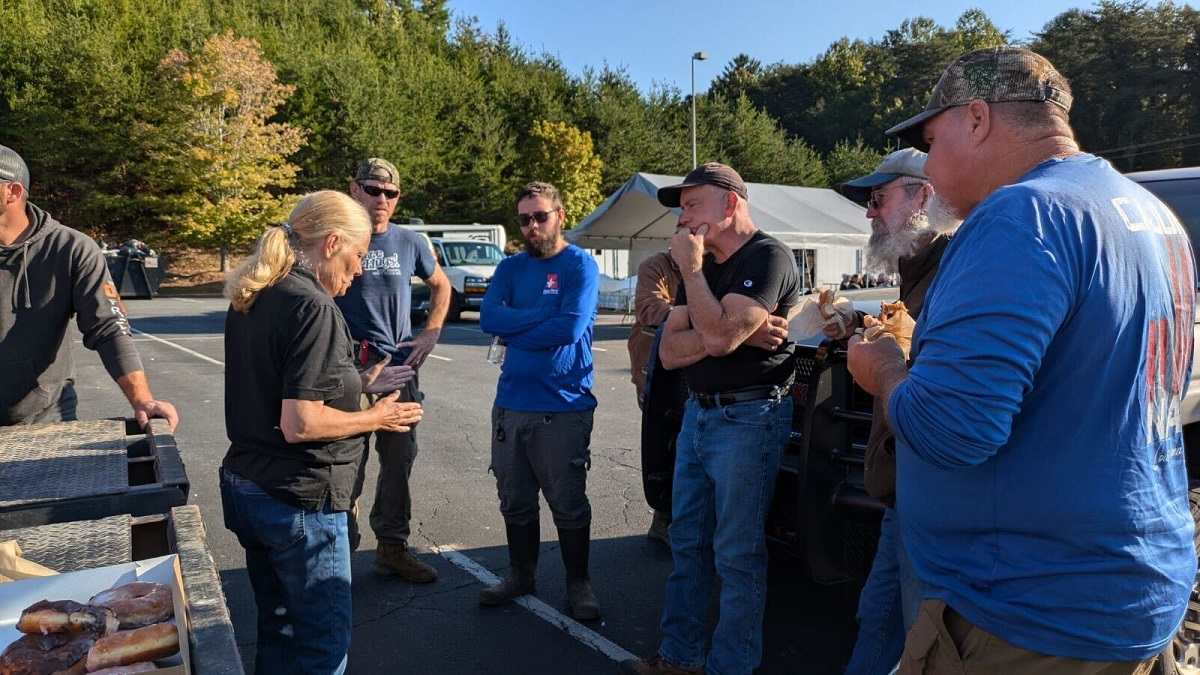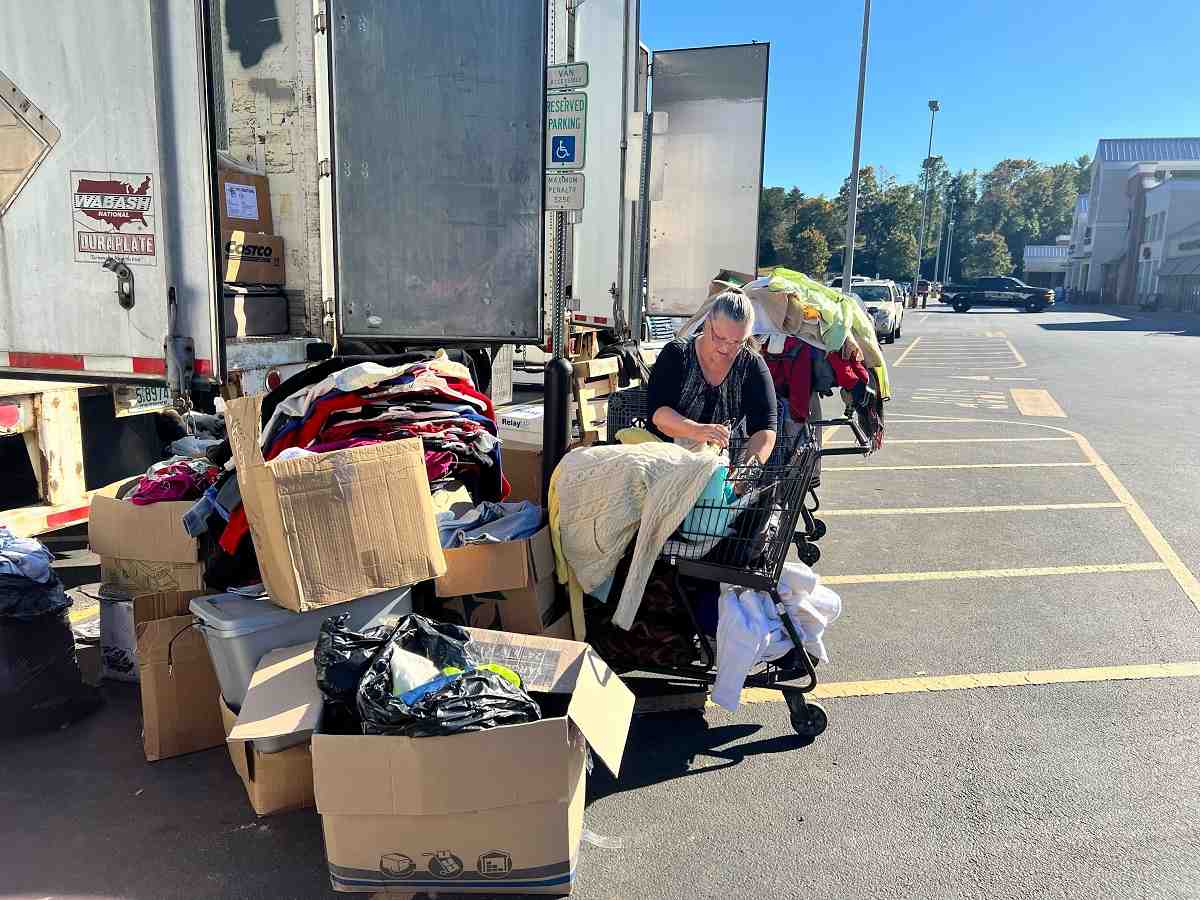
Hilary Yoxall speaks with volunteers including Lewis Arthur.
12:58 JST, October 24, 2024
LAKE LURE, N.C. – It started with hot coffee.
Hurricane Helene had just cut off this already isolated foothill town from everything: power, water, information. Paralyzed, the only thing that residents Carin Harris and Hilary Yoxall could think to do was post up outside their Ingles supermarket and hand out something warm. Soon, donations began to pour in, and a makeshift supplies distribution center emerged from a parking lot off the main two-lane road.
Then everything got more complicated.
A group called Veterans on Patrol showed up in Rutherford County late on the night of Oct. 11, just four people with no supplies. But their leader, Lewis Arthur, came with a lot of promises and a big vision, which he said was sent from God: a three-year plan to help this lakeside community and others around here bounce back, according to Yoxall and Arthur.
At first, it did seem like a godsend, Yoxall, Harris and other residents said. They started organizing the piles of diapers, boxes of canned food and mounds of winter clothes. But as soon as Yoxall, a retired Army nurse, and Arthur got to talking, and he started telling her about his work fighting cartels at the border, about his need for armed security, she got a bad feeling.
“There’s something wrong here,” she told another longtime resident and fellow organizer.
What she and others didn’t know yet was that Veterans on Patrol is an anti-government group steeped in conspiracy theories and that it has a well-documented history of embedding in communities to launch missions related to migrants or purported child trafficking, according to the Southern Poverty Law Center and the Western States Center, two watchdog groups.
And that the group was motivated to come to this small town because its members believed that the government was using the hurricane to move people here off lithium-rich land and stop them from getting it back, according to the group’s posts on Telegram, the messaging service.
“Hurricane Helene was an act of war perpetuated by the United States Military”; a “land grab” responsible for “murdering hundreds, if not thousands, of Americans,” the group said on Oct. 3. That same day, it launched its disaster deployment operation, stating that it was “coming to the aid of those who will not sell, have stolen, or be restricted their property” and to replace the Federal Emergency Management Agency.
Over the course of 11 days, this makeshift hurricane supplies depot in a supermarket parking lot became a snapshot of the chaos that can unfold in some corners of post-disaster America: Residents came together to help their community because local officials were unable to. People came searching for critical supplies because the federal government does not give those out as part of its disaster response. An extremist group motivated by anti-government beliefs and conspiracy theories was able to show up, wield influence and become a source of help for some and fear for others.
And in the mix of all that, an armed man from a town over, also fueled by viral, anti-government misinformation, joined the fray. He showed up right when Veterans on Patrol did, Yoxall and two other volunteers said, joining their Sunday prayer circle. Then he talked about “hunting FEMA,” she said. Police eventually arrested and charged him with “going armed to the terror of the public.”
“What is happening in my backyard?” Yoxall said last week. “I don’t know these people, and if they are trying to get a foothold here in my community, they are getting a good start.”
Helene was historic for many reasons. It was a hurricane in the mountains that spurred massive floods and landslides, destroying thousands of homes and killing more than 200 people. Researchers also said it led to an unprecedented amount of misinformation directed at FEMA and its workers, often amplified by figures such as former president Donald Trump.
In addition to Veterans on Patrol, members of more than a dozen other extremist, white-nationalist and militia organizations also came to some hard-hit western North Carolina towns for disaster response, according to the Institute for Strategic Dialogue, which studies extremism and disinformation, and the Southern Poverty Law Center.
“Misinformation has always been the bane of disaster response,” said Andy Carvin, managing editor of the Atlantic Council’s Digital Forensic Research Lab, but with Helene “we’re seeing this additional layer of craven politicization about the federal disaster response itself.”
And it’s had consequences. Armed threats at the Ingles parking lot and elsewhere caused snags in FEMA’s work and that of other federal agencies on the ground, according to federal officials. For at least 48 hours, workers and contractors doing an array of jobs such as clearing trees and inspecting homes stopped working. FEMA adjusted its security practices, for example, not going door-to-door in certain locations. The agency, already stretched thin, has had to divert time and resources away from helping people to combating misinformation, according to a FEMA official who spoke on the condition of anonymity to speak freely on the situation.
“We are used to dealing with threats, but the unprecedented piece we have is it’s part of the political climate we are in,” the official said. The worst part, though, is that “this rhetoric may be discouraging people from applying for assistance.”
In Lake Lure, Veterans on Patrol showed up to take over logistics, the head of the group, whose full name is Michael Lewis Arthur Meyer, told The Post in one of several interviews. (Arthur is not a veteran.) Its members put up a big, colorful circus tent. They hung an American flag and shirts on hangers that declared, “Try this in a small town,” and, “Let’s go Brandon,” referring to an epithet targeting President Joe Biden. They brought in big trucks full of water and generators and promised they had a lot more coming.
Arthur, who says he is guided by his Christian faith, said he diverted from a mission in Chicago hunting Salvadoran cartels and an “Iranian cell” after seeing reports that authorities threatened to arrest a volunteer pilot trying to rescue people in the Lake Lure area. Journalists verified much of the story, which became fodder for the right wing: evidence that the government was not helping but hindering private citizens’ relief efforts.
Arthur said he was acting without political motive. Disasters like this, he added, are “our only opportunity to get everyone to put aside the politics and BS and come together.”
That was a far different tone than his online posts. Beneath photos of donated aid on Telegram, the group said that “people are very angry at FEMA” and that it had intel on “FEMA pulling a dirty trick on good people.”
Arthur made similar comments to locals, Yoxall said. Yet, she added shortly after they arrived, she could not deny that his group was helping.
“It’s complicated because a lot of people still don’t trust him, and I am in that group, but the man is doing good work,” she said.
She wouldn’t always feel that way.
How one tweet can mobilize
In the immediate aftermath of Helene’s devastation, residents in hard-hit towns began sharing shocking images and videos of what they were having to do to survive. The federal government wasn’t there, people said. In many places, they were right. North Carolina received its federal disaster declaration on Sept. 29, but the mechanisms needed to trigger those massive response operations were just getting started.
Their shock, anger and pleas for help caught fire, though, especially with big right-wing voices. On platforms like X, algorithms wove real stories alongside full-blown conspiracies.
On Sept. 29, an X user suggested that the supposed presence of lithium provided a motive for someone to “modify” the storm, to steal access to the mineral. Prominent voices amplified the theory to millions of people.
Groups such as Veterans on Patrol soon picked it up. “Isn’t it ironic how much lithium is available in the areas targeted by Helene?” the group asked in a Sept. 30 Telegram post.
(There is, in fact, a lithium mine in the North Carolina foothills about a 60-mile drive from Lake Lure. But that area wasn’t as affected, and the government cannot control a hurricane’s path. In an interview, Arthur said he did not want to talk about conspiracy theories, just his mission.)
The theory deepened. Chris Martenson, a right-leaning, conspiracy-minded author and influencer with more than 200,000 followers, published on his verified X account that he had heard that residents in nearby Chimney Rock were told that their town “was being bulldozed, bodies and all and the land was being seized by the federal government,” possibly to mine lithium. (Martenson didn’t respond to requests seeking comment.)
This rumor exploded online thanks to a spate of X accounts known for promoting conspiracy theories, according to Connexions Global Matrix, a nonprofit that works on disinformation and media literacy, and NewsGuard, which monitors media credibility and misinformation.
Social media messages like these help conspiracy-driven groups establish their authority, said Cody Zoschak, senior analyst at the nonprofit Institute for Strategic Dialogue.
“A tweet like that creates an atmosphere where they can mobilize, as we saw them do in North Carolina, and to find and identify people who might be sympathetic to their cause,” said Zoschak. “Then the militia can step in and say, ‘We’re the solution.’”
Amid this swirl of suspicion, Trump also started casting doubts on FEMA. On the morning of Oct. 3, he took to Truth Social and shared that “FEMA is largely MIA because it has diverted resources for immigration resettlement.”
That same day, Veterans on Patrol decided to head straight toward Chimney Rock with a disaster response mission titled “OPERATION STEER IT BACK.” They did a callout, writing “if you are willing to mobilize with North Carolina families and remove FEMA from North Carolina.”
While it wasn’t Veterans on Patrol’s first disaster mission, Helene was a pivot from its usual focus. Arthur started the group in 2015 with the stated goal of helping homeless vets. Based in Arizona, extremist researchers say they quickly became vigilantes, feeding off Pizzagate and QAnon conspiracies to pursue child and sex traffickers along the border. He developed a criminal record and was convicted in Arizona of assault, records show.
This past February to March, Veterans on Patrol embedded in the small town of Washtucana, Washington, because Arthur believed the town was the center of a child trafficking operation. Then, they relocated to Spokane.
In the early days of the Helene disaster, Veterans on Patrol doubled down on anti-government sentiments. It said FEMA “has billions in untapped resources designated for the 6+ million more Migrants, terrorists, and criminals being brought up RIGHT NOW.”
“FEMA IS THE PROBLEM, NOT THE ANSWER!”
In some hard-hit mountain communities of North Carolina, some people didn’t know what to believe. Residents here “don’t trust and have felt abandoned by the government,” said Chris Malcolm, a disaster response volunteer who also lives in Rutherford County.
In four local Facebook groups spanning three rural counties, as well in massive Helene-focused ones with 30,000 members, posts echoing misinformation became sandwiched between requests for helping stray dogs, finding generators for one needy family or another, and updates on power being restored.
Four locals said they’ve had to persuade friends and neighbors to sign up for FEMA assistance, combating falsehoods that the agency is trying to steal their homes and personal information.
Still, Malcolm said, some people have told the agency, “We don’t want you here.” He can sympathize, since trusting them has been hard for him, too. “We don’t know if FEMA will help,” he said. “We are hopeful that they will.”
‘The standoff in Lake Lure’

Volunteers sort through donations left behind after Veterans on Patrol gave up control of the donation site.
On a recent sunny, crisp afternoon, about a dozen people, some wearing fatigue-style pants and others in camouflage hats, buzzed around Veterans on Patrol’s distribution site. It had been about a week since they arrived. Members of the group unloaded garbage bags and boxes filled with supplies from the packed bed of a pickup truck into the circus tent.
Nearby, a FEMA motor home was set up where agency officials were helping residents fill out paperwork and answer questions.
Derrik Staley, a manager at the Ingles supermarket, said that he was happy to host Veterans on Patrol’s relief efforts, noting “how they’ve gotten bigger and bigger.”
“We appreciate them being here in peoples’ times of need,” he said.
Allen Hardin, a recently retired lieutenant with the Rutherford County Sheriff’s Office, sat in a patrol car. He said that since the threat against FEMA, the sheriff would probably keep an officer posted in the parking lot as long as the Veterans on Patrol operation remained. But there have been no issues for officers to get involved in.
“They’ll talk your head off,” Hardin noted of the group, “but that’s it.”
By this point, Yoxall had read a lot about Arthur and his group online and said she was “afraid for her community.” She didn’t understand why they had picked her tiny town or why they wanted to stay here for three years, which Arthur never explained.
“I’m not sleeping,” she said Friday night. “It’s getting scary.”
She and five other volunteers also began to doubt Arthur’s glowing social media posts about his group’s assistance, which he used to call for more donations. They said they grew suspicious that supplies might not be reaching the churches that were supposed to receive them; one person surreptitiously filmed a truck on its supply journey.
Harris and Yoxall decided to confront Arthur directly. “We appreciate what you’re trying to do here, but you’re not part of this community, you can back off the supplies,” Yoxall said she told him.
And that’s when he snapped, they said.
“He was threatening me,” Harris said Saturday morning. “Then it turned into people calling me last night, like, be careful. Be careful. Really, he’s talking a lot about you.”
After that, they decided to walk away.
On Monday morning, they went back, again telling Arthur to pack it up, showing the encounter on a video call with a reporter. The Ingles supermarket chain had also gotten involved, the women said. And the people who lent him the giant circus tent and massive trailers no longer wanted to be a part of this.
At one point, Arthur started running, blocking some people from picking up goods.
“Those are for the people,” Yoxall and Harris yelled. “Those are donations for people, for our community. Hey, that’s donations you cant touch that!”
“This is nuts,” Yoxall, stepping off to the side, exclaimed into her phone. “You can call this the standoff in Lake Lure.”
Soon enough, Veterans on Patrol started packing up, and Arthur disappeared for most of the day. Lake Lure police officers at the scene said that they were not filing charges and that the group was leaving on its own volition.
Amid the chaos Monday, people were still coming to the big striped tent for supplies, a new routine that for some residents had become like therapy. Yet there was tension all around.
Eunice Gonzalez, who came to the depot before to get clothes, wipes and water, had been looking for blankets when, she said, suddenly someone accused her of stealing supplies meant for struggling mountain communities. They pointed at her and said they had seen her there the night before, asking if she was part of the group sending supplies elsewhere. She knew nothing about it.
“I don’t know what happened,” she said. “I don’t want to know, either.”
Arthur said that he is the victim, making a range of accusations against the women who had confronted him. As of Tuesday, he said he was posted up next to dumpsters at a nature park across the street. He said his group would next find private land, he said, and continue their “humanitarian work” but would have license plate readers so he “can see everyone who is stealing.”
Harris said she and the other women are looking to send the remaining clothes, bottled water and other supplies to another hard-hit town. She’s still working to feed her community, but doesn’t know how long she’ll be able to keep it up.
Asked whether she will still to be involved, Yoxall said “that’s a hard question.”
“My heart says yes, God to me says yes, but the human part of me?” she said. “I don’t know how it exploded like this. I really don’t.”
Top Articles in News Services
-

Survey Shows False Election Info Perceived as True
-

Hong Kong Ex-Publisher Jimmy Lai’s Sentence Raises International Outcry as China Defends It
-

Japan’s Nikkei Stock Average Touches 58,000 as Yen, Jgbs Rally on Election Fallout (UPDATE 1)
-

Japan’s Nikkei Stock Average Falls as US-Iran Tensions Unsettle Investors (UPDATE 1)
-

Trump Names Former Federal Reserve Governor Warsh as the Next Fed Chair, Replacing Powell
JN ACCESS RANKING
-

Producer Behind Pop Group XG Arrested for Cocaine Possession
-

Japan PM Takaichi’s Cabinet Resigns en Masse
-

Man Infected with Measles Reportedly Dined at Restaurant in Tokyo Station
-

Israeli Ambassador to Japan Speaks about Japan’s Role in the Reconstruction of Gaza
-

Videos Plagiarized, Reposted with False Subtitles Claiming ‘Ryukyu Belongs to China’; Anti-China False Information Also Posted in Japan























